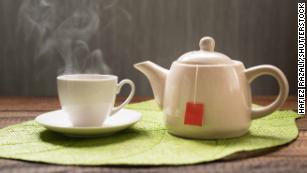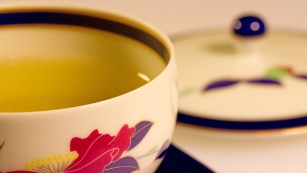
(CNN)For centuries, tea has been used for far more than quenching thirst. Around the world people drink itto relax, reinvigorate and soothe, and it’s something we need now more than ever. In the UK, where tea drinkers imbibe 100 million cupsevery day, according to the UK’s Tea Advisory Panel,thebeverage remains part of the national psyche — despite a growing preference for lattes, espressos and flat whites. The sentiment that a restorativecup of tea makes everything better still holds true. With tea consumption growing around the world, the United Nations has designated May 21 “International Tea Day.”

Reading the tea leaves about whether drinking green tea is good for youEven in the United States, long a coffee-dominated country, tea drinking is growing in popularity, with the country consuming 0.4 kilograms (14 ounces) of tea leaves per person a year compared with 0.36 kilograms (12.7 ounces) in 2007 according to the United Nations, as people switch away from soda, milk and fruit drinks. Scientists are beginning to look into just how tea might affect mood and cognition. Specifically, they’re investigating whether it’s relaxing and alerting effects are a direct biological outcome of the compounds intea or whether they come from the context in which the drink is consumed — preparing your brew, choosing your favorite cup and sitting down for a brief respite from the world. Or both. Green, oolongand black tea come from the same plant — Camellia sinensis. Green tea, however,is processed in a different way, which results in higher levels of some of the compounds that scientists believe have positive effectson our mental health.
Brain boost
Drinking green tea has been found to improve brain function in healthy people, said Stefan Borgwardt, chair and director of the department of psychiatry and psychotherapy at the University of Lübeck, Germany.In a 2014 study, he gave green tea extracts equivalent to one or two cups of green tea to 12 healthy volunteers and imaged their brains to analyzechanges in connectivity inside certain brain regions. “We noticed an increased connectivity in regions of the brain associated with working memory,” he said via email. And a 2017 review of more than 100 studies he coauthored found that green tea can impact the brain in three ways: It can influence psychopathological symptoms such as reducing anxiety; cognition by benefiting memory and attention; and brain function, specifically memory. That review concluded that “it would be desirable” for more Westerners to consume at least 100 milliliters (3.3 fluid ounces) of green tea each day “to protect neurocognitive function.”However, Borgwardt cautioned that the effects aren’t large, and current evidence is mainly provided by small-scale studies.
Different compounds
What’s less clear is which compounds found in tea are responsible for various improvements in our brain power and whether they work alone or together. The most important are antioxidants such as epigallocatechin gallate (EGCG), the most abundant, followed byL-theanine, an amino acid found in tea leaves, and caffeine.

Can green tea boost your brainpower and treat disease?Borgwardt said the benefits are likely not the consequence of a single component but linked to the presence of both caffeine and L-theanine.There are also suggestions that tea could improve the symptoms of depression, dementia and Down syndrome. A 2018 study conducted in South Korea found that frequent green tea drinkers were 21% less likely to develop depression over their lifetime than those who were non-drinkers. However, as an observational study, it couldn’t establish cause and effect, only association. Borgwardt said that studies in animals have suggested that there arechanges in the brain’s gray matter and potentially, these effects of tea could be used to target psychiatric diseases such as depression and dementia. But he noted that the research was at a very early stage, and that experimental studies should be confirmed by larger clinical trials before drawing any conclusions.
No harm
Tea also has some benefits for our physical health –it’s linked to a longer life, could reduce some risk factors for cardiovascular disease such as heart attack and stroke, and may also have a fat-busting effect.Gunter Kuhnle, an associate professor at the department of food and nutritional science at the University of Reading in the UK, researches the benefits of flavanols, which are found in tea, cocoa and some fruits.His research, published last year, found that people who consume a diet rich in flavanol-heavy food — such as berries, tea and apples — tend to have lower blood pressure.While other studies have found a link between flavanols and health benefits, this study was the first to measure intake of the compounds objectively using biomarkers found in urine.Most studies assessing the benefits of tea and its beneficial compounds are usually observational, reliant on subjective self-reporting and the impact of how food is prepared and consumed, Kuhnle said.

Drinking green tea, rather than black, may help you live longer, new study suggestsWe need better data to truly assess the benefits of tea on our mental and physical well-being,considering the many differences in how it’s consumed in different countries, Kuhnle said.In the UK, he noted that tea is a typical working-class drink, whereas in the US it’s a drink more commonly associated with higher status. So studies in the US may show a lot more benefits, but those could be due to socioeconomic background. However, with the exception of green tea supplements, which have been linked to liver damage, and scalding hot tea, which has been linked to esophageal cancer, there’s no real downside to a cup of tea, Kuhnle said. As a German living in the UK, he has embraced the tradition. “I think most people thrive on rituals. It’s a comforting thing. If there’s anything wrong, here it’s a cup of tea that’s needed.”
